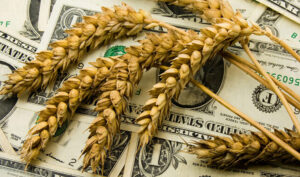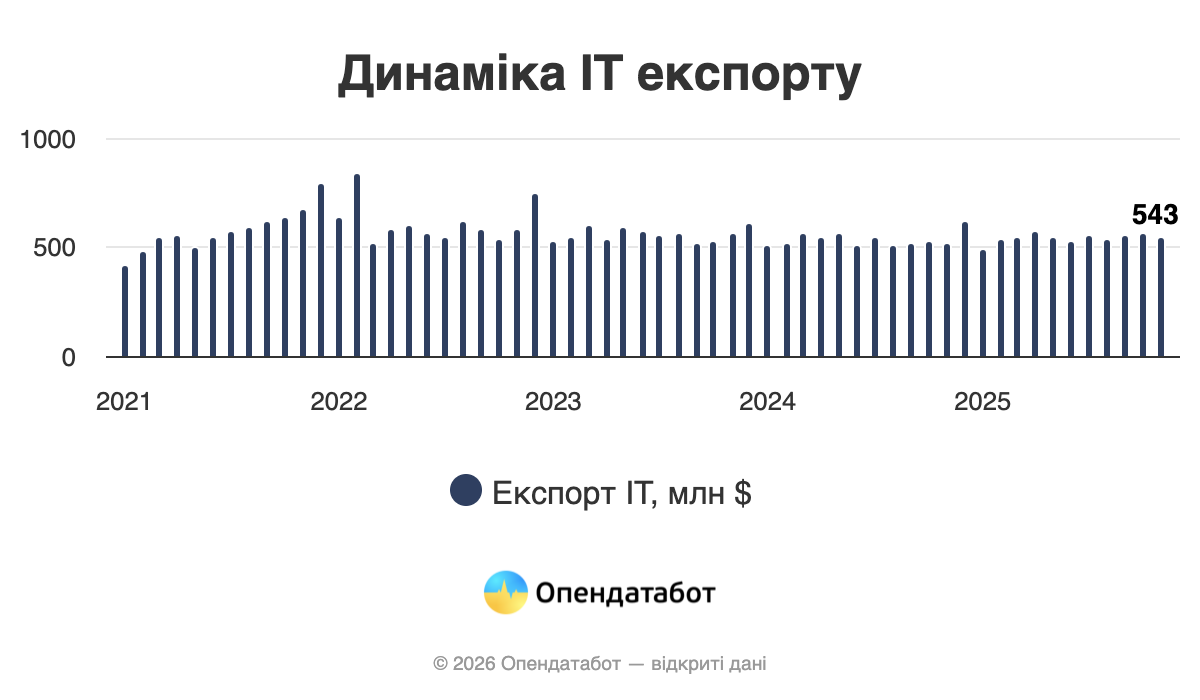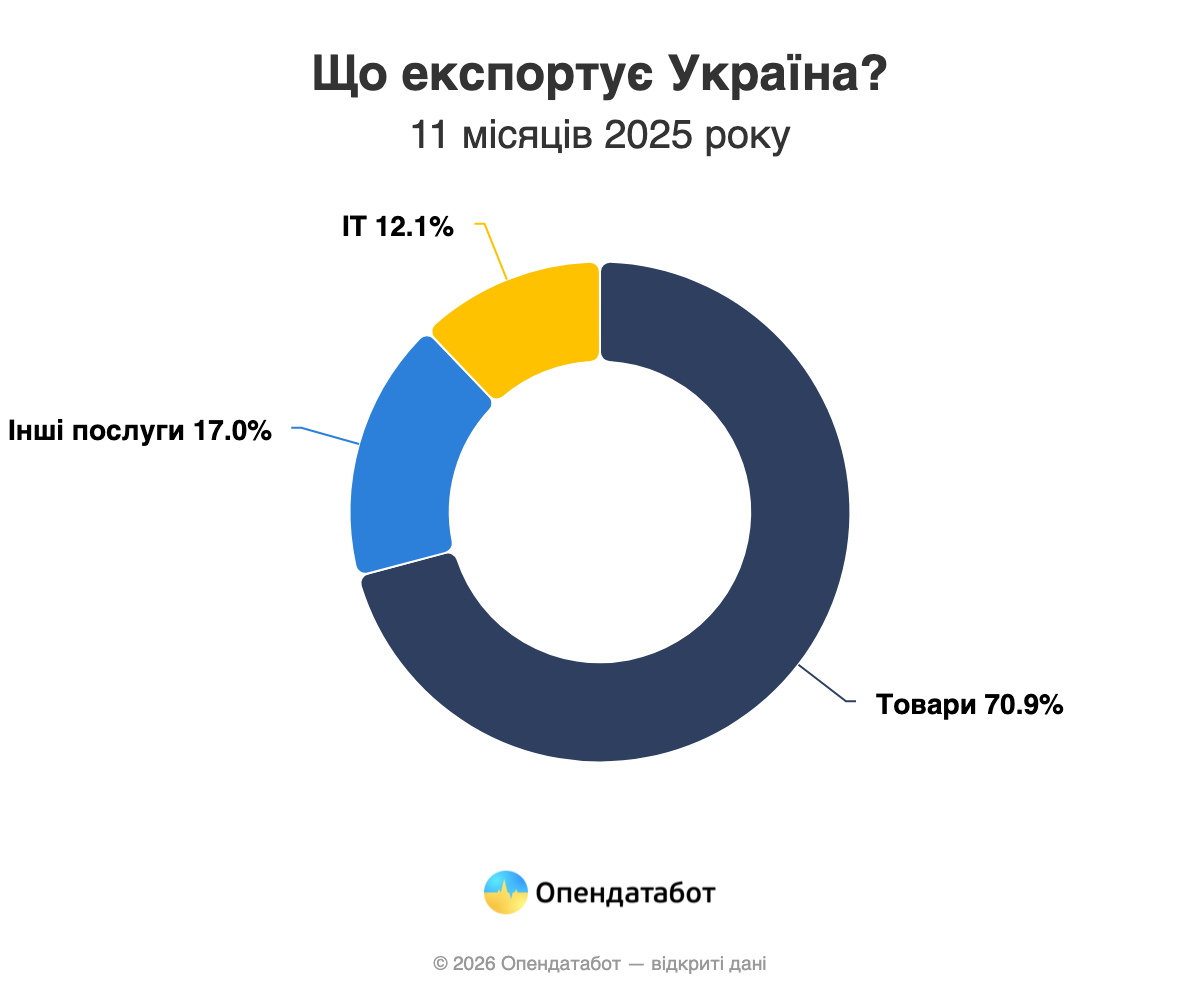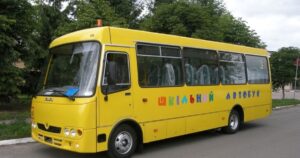
According to the results of 2025, Ukraine exported agricultural products worth $22.53 billion, which is 8.8%, or $2.15 billion, less than the previous year, according to the Ukrainian Agribusiness Club (UAC).
The association noted that despite the decrease in foreign exchange earnings, the share of the agro-industrial complex in the overall structure of goods exports in 2025 was 56.1%.
“Although this percentage has declined slightly compared to the record year of 2023, when agricultural products accounted for 61% of total exports, the industry continues to generate more than half of the country’s foreign trade revenues,” analysts emphasized.
The most noticeable trend was a reduction in agricultural exports to the European Union. While in 2022-2024 the EU’s share in the structure of Ukrainian agricultural exports consistently exceeded 50%, in 2025 it fell to 47.5% ($10.7 billion), according to statistics.
Some of the factors influencing this are changes in logistics routes and tighter regulatory restrictions on the European market. There has also been a general decline in trade dynamics, namely: the balance with the EU fell to $6.06 billion compared to $8.87 billion in 2024, analysts noted.
They emphasized that against the backdrop of declining export revenues, there is a reverse trend in the import segment. In 2025, purchases of foreign agricultural products rose to a record $8.75 billion over the past five years.
“Although the share of agricultural products in Ukraine’s total imports has remained stable over the past four years at around 10.8%, in absolute terms, spending on food imports is growing every year. At the same time, in 2025, more than 53% of all agricultural imports ($4.64 billion) came from European Union countries, which underscores the deep integration of Ukraine’s consumer market with the European market,” the UACB concluded.

The IT sector brought $5.97 billion to the state treasury in 11 months of 2025, according to the National Bank of Ukraine. The amount increased slightly over the year, by just over 2%.
Ukraine has earned $5.97 billion from the export of IT services for the first half of 2025. This is 2.4% more than in the same period in 2024. However, it is impossible to say that IT is in its heyday: it is still 3% less than in 2021 and almost 10% less than in the peak year of 2022.
It is worth noting that monthly exports of IT services bring in an average of $543 million. For comparison, the average monthly figure was $612 million in 2022.
Currently, IT services account for 42% of all service exports. Compared to the country’s total exports (both goods and services), IT accounts for 12% of the total.
At the same time, exports of services decreased by 9% to $14.33 billion over the year. Total exports of goods and services also decreased by 5% to $49.21 billion.
https://opendatabot.ua/analytics/it-export-25



The municipal institution “Center for Financial and Statistical Monitoring, Material and Technical and Information Support of Educational Institutions” of the Mykolaiv Regional Council will purchase 40 Ataman school buses manufactured by the Cherkasy Bus plant by June 1 of this year for UAH 147.83 million, compared to the expected purchase price of UAH 148.36 million.
According to a report in Prozorro, the city council signed the relevant agreement with Isuzu-Ataman Ukraine JSC on December 31 following the results of a tender in which the company was the only participant.
In particular, 39 regular school buses will be purchased for UAH 143.91 million (including VAT), at a price of UAH 3.69 million per bus, and one bus with two seats for schoolchildren with limited mobility will be purchased for UAH 3.92 million.
Full payment is expected within 10 banking days.
Isuzu-Ataman Ukraine will supply buses manufactured in 2025 that meet Euro 5 environmental standards, with 28 seats for schoolchildren and three for accompanying persons and crew members. The degree of localization is 68.8%.
The specialized bus has 21 seats for schoolchildren, including two for children with limited mobility, as well as two seats for accompanying persons. The degree of localization is almost 71%.
According to YouControl, PJSC Isuzu-Ataman Ukraine, which, among other things, trades in Isuzu and Ataman vehicles, received UAH 49.2 million in net profit in January-September 2025, which is 56% more than in the same period in 2024, and its net income increased 2.4 times to UAH 408 million.
As reported, the state budget subsidy for the purchase of school buses next year is UAH 2 billion, compared to UAH 1.6 billion in 2025.
According to the Ministry of Economy, the Mykolaiv region purchased 25 buses last year. The subsidy from the state budget for the region amounted to UAH 23.54 million.
Since 2024, the School Bus program has been implemented thanks to financial cooperation between the EU and Ukraine within the framework of the Ukraine Facility instrument. In particular, school buses must have seats for students with limited mobility.
The required level of localization in 2026 is at least 30%.
According to preliminary data, 720 school buses were implemented in 2025 with state subsidies and co-financing from local communities.

In 2025, Moldova was heavily dependent on imports of milk and dairy products, with Ukraine supplying more than two-thirds of the product to the local market, according to the Moldovan publication rupor.md, citing data from the republic’s Customs Service.
According to Moldovan customs, in January–November 2025, Moldova imported 26.7 thousand tons of milk and dairy products worth a total of $23.4 million. The largest volume of raw milk as a raw material came from Ukraine — 16.8 thousand tons (66.1% of total imports). Romania, Poland, and Belarus are also among the leaders in milk raw material supplies.
According to customs data, Moldova also imported finished dairy products, including sour cream and milk mixtures.
In the segment of full-fat sour cream (over 10%), Ukraine’s share was even higher — over 80% of imports. In addition, Ukraine led in the supply of milk and sour cream with added sweeteners, accounting for almost 68% of imports.
Ukraine significantly outperformed its competitors from Romania, Poland, and Belarus in the supply of dairy products.
“Moldova’s dependence on milk imports from Ukraine is due to close trade ties between the countries and geographical proximity, which significantly reduces logistics costs for importers,” Moldovan experts explained.

In 2025, the state-owned enterprise Medical Procurement of Ukraine (MPU) purchased 866 items of medical goods for a total of UAH 15.7 billion from the budget, as well as 48 units of equipment for UAH 426 million from donors to the UNITED24 platform.
According to a press release from MZU, medical goods purchased with budget funds account for more than 97% of the quantities allocated by the Ministry of Health.
The amount of savings on purchases is UAH 1.7 billion.
In particular, the largest amount of state budget funds was spent on medicines and medical products for the treatment of cardiovascular diseases: 159 items were purchased for UAH 2.7 billion.
The Ministry of Health purchased 34 items of innovative medicines under managed access agreements (MAA) for UAH 2.4 billion.
The Ministry of Health purchased 220 items of drugs for the treatment of cancer for UAH 2.3 billion, 35 items for the treatment of hemophilia in adults and children for UAH 1.6 billion, and 130 items of medical products for blood donation for UAH 1.4 billion.
The MOH notes that 30 armored evacuation vehicles for military medics, four ambulances, and 11 X-ray machines were purchased for a total of UAH 426 million using funds from the UNITED24 fundraising platform.
In addition, the Ministry of Health reports that in 2025, through the Prozorro Market electronic catalog, the medical section of which is administered by the Ministry of Health, purchases were made by 2,874 hospitals that concluded more than 60,000 agreements worth more than UAH 21 billion, which is almost a third more than the amount of purchases using the e-catalog in 2024.

According to the Ministry of Tourism and Sports of Thailand, from January 1 to December 21, 2025, 31.756 million foreign tourists visited the country, which is 7.25% less than in the same period in 2024. The largest markets during this period were Malaysia (4.38 million), China (4.36 million), India (2.40 million), and Russia (1.80 million).
Based on the results of the whole of 2025, the agency estimates the inbound flow at almost 32.97 million tourists (-7.23% y/y) and the revenue from their spending at 1.536 trillion baht (-4.71%). The top 10 markets by number of arrivals included Malaysia (4,520,856), China (4,473,992), India (2,487,319), Russia (1,898,837), South Korea (1,555,227), Japan (1,091,227), the United Kingdom (1,083,162), the United States (1,081,929), Taiwan (987,633), and Singapore (967,341).
Ukraine did not make it into the top ten countries in terms of tourist flow to Thailand in 2025. This means that the flow from Ukraine was lower than that of the country in 10th place (Singapore – about 967,000 tourists).
In the resort real estate market, this usually leads to tougher competition for buyers and developers focusing on audiences from countries that generate the main tourist flow (primarily Malaysia, China, India, Russia, and other top 10 markets).